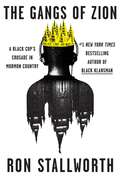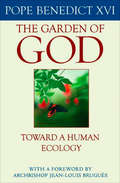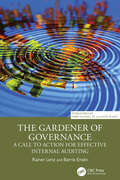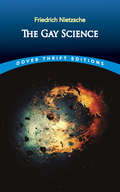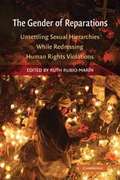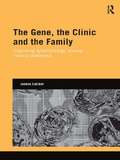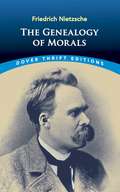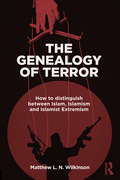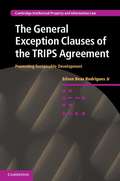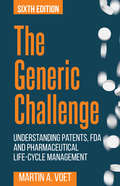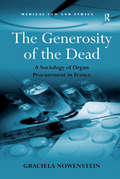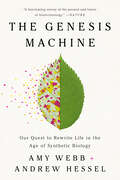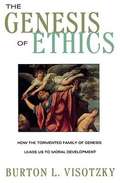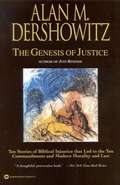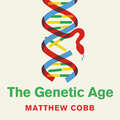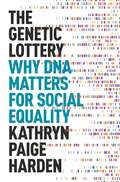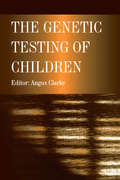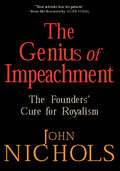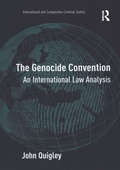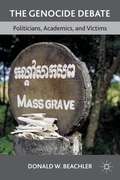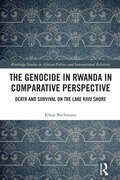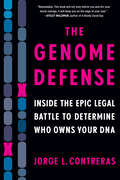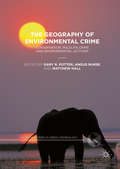- Table View
- List View
The Gangs of Zion: A Black Cop's Crusade in Mormon Country
by Ron StallworthNew York Times bestselling author of Black Klansman, Ron Stallworth, returns with another firsthand account of trailblazing police work in the most unlikely place for a Black cop in the &’90s. Determined to pursue his passion for undercover work wherever it leads, Ron Stallworth finally lands in Salt Lake City, Utah. Once again, he&’s an outsider—not only as a Black man on a mostly white police force but also as an unapologetic nonbeliever in a state dominated by the Church of Jesus Christ of Latter-Day Saints. But soon after his first drug bust in the Beehive, Stallworth makes a startling discovery—Bloods and Crips are infiltrating Mormon Country, threatening to turn the deeply conservative community into a hotbed of crime. Kids are bombing homes while carrying pocket versions of the Book of Mormon, yet his fellow cops are in denial that gangs are wreaking havoc in their Christian town. Now Stallworth has a new mission. Whether facing off with skinheads at a downtown bar or schooling white Crips blasting &“F*ck tha Police,&” he is intent on stemming the tide of gangs into the state. But those he expected to be his allies either have their heads in the sand or their own agendas—from the racist Mormon legislator to the community activist exploiting a fatal gang incident to spread paranoia over an imaginary race war. As he butts heads with these so-called leaders, Stallworth also realizes that gangsta rap has the key to the g-code. He becomes obsessed with—even defensive of—the music he once loathed and puts himself on the front lines of America&’s culture war. Now he&’s spitting uncensored lyrics before Congress and taking the stand in the 1993 murder case that puts hip-hop on trial. But the more Stallworth speaks truth to power, the more determined the gatekeepers in Utah are to silence him, and not even twenty-three years of police work could prepare him for how low they would stoop.
The Garden of God: Toward a Human Ecology
by Pope Benedict XVIIn this collection of his writings, Pope Benedict XVI speak to the important relationships between the environment, Catholic social teaching, and theology. During his papacy, Pope Benedict XVI repeatedly drew attention to the environment. He spoke of preserving it, such as his address concerning the Amazon rainforest and his letter regarding the Arctic, and of distributing its vital resources—such as water—more equitably. Benedict led by example when the Vatican became the first carbon-neutral country in the world. This book collects Benedict&’s many audiences, addresses, letters, and homilies on a wide range of topics dealing with the world about us. The major themes and connections he explores include creation and the natural world; the environment, science, and technology; and hunger, poverty, and the earth&’s resources. In these pages, Benedict insists that if we truly desire peace, we must consciously nurture all of creation. He speaks in favor of alternative energy while speaking out against the spread of nuclear weapons and threats to biodiversity. He urges sustainable development, equitable distribution of food and water, and an end to hunger. In summation, Benedict argues that our love of God should cause us to protect the environment, and that in turn, our heightened appreciation of the natural world will draw us closer to God.
The Gardener of Alcatraz: A True Story
by Emma Bland SmithA prisoner gardens his way to freedom in this inspiring picture-book biography.When Elliott Michener was locked away in Alcatraz for counterfeiting, he was determined to defy the odds and bust out. But when he got a job tending the prison garden, a funny thing happened. He found new interests and skills--and a sense of dignity and fulfillment. Elliott transformed Alcatraz Island, and the island transformed him. Told with empathy and a storyteller's flair, Elliott's story is funny, touching, and unexpectedly relevant. Back matter about the history of Alcatraz and the US prison system today invites meaningful discussion.
The Gardener of Governance: A Call to Action for Effective Internal Auditing (Security, Audit and Leadership Series)
by Rainer Lenz Barrie EnslinThis book builds on the popular GARDENER OF GOVERNANCE article, which enjoys amazing traction in the professional community globally and has been translated into 25+ languages. The Lenz and Jeppesen (2022) thought-piece introduced the 5 "Ps" as paths for the betterment of internal auditing: People, Public, Performance (Prosperity), Purpose (Profession) and Planet. These main fields of action and focus for the internal audit profession may determine the future role of internal auditing, its legitimacy, relevance and significance. The book aims to provide practical guidance for performing impactful internal audit assignments. Some readers will no doubt view the authors as unorthodox and the book may be a stretch for the purist, insisting on adherence to traditional rules.It is pleasing to see that the new Global Internal Audit Standards advocate a pragmatic and holistic approach, which should further stimulate internal audit functions moving into uncharted territory that may require from them to become more resourceful in their approach as advocated for by the authors. This book is an inspiration and encouragement for all internal auditors who want to do better and aim higher, particularly the forthcoming generation of internal auditors who are open-minded and who may sometimes doubt themselves because of opposition or insecurity. We believe that internal auditors who absorb the knowledge and make it their own will benefit from this book on their career trajectory.This easy read is relatable, engaging and convincing to support internal auditors globally who are seeking to widen their repertoire on their journey to become modern and effective internal auditors. This book is relevant and will be insightful to internal auditors, students and lecturers, as well as other stakeholders including senior and executive managers and board members. Drawing on Rainer’s vast practical expertise gained from over 300 audits in more than 50 countries, along with his series of publications and adding Barrie’s hands-on advice benefitting from 30 years of entrepreneurial experience, the authors create an interesting blend of creative authoring that challenges the status quo and advises emerging internal auditors on becoming more impactful and effective.We’re dropping the pebble in the pond. Let’s see how far the ripples spread and to what effect.
The Gay Science: With A Prelude In Rhymes And An Appendix Of Songs (Dover Thrift Editions)
by Friedrich NietzscheAlthough dour in appearance and formidable in reputation, Friedrich Nietzsche was an ardent practitioner of the art of poetry—known in twelfth-century Provençal as "the gay science." This extensive collection of prose and verse offers a sophisticated treatment of the philosophical themes and views central to his thinking, as well as the ideas that proved most influential to later philosophers. Dating from the era when Nietzsche was at the peak of his intellectual powers, most of this book was written just before Thus Spoke Zarathustra, and the rest of it five years later, after Beyond Good and Evil. Zarathustra makes his first appearance in these pages, along with the author's well-known proclamation of the death of God. Readers will find this volume a wellspring for some of Nietzsche's most sustained and thought-provoking discussions of art and morality, knowledge and truth, the intellectual conscience, and the origin of logic, as well as the largest collection of Nietzsche's published poetry.
The Gender of Reparations
by Ruth Rubio-MarínReparations programs seeking to provide for victims of gross and systematic human rights violations are becoming an increasingly frequent feature of transitional and post-conflict processes. Given that women represent a very large proportion of the victims of these conflicts and authoritarianism, and that women arguably experience conflicts in a distinct manner, it makes sense to examine whether reparations programs can be designed to redress women more fairly and efficiently and seek to subvert gender hierarchies that often antecede the conflict. Focusing on themes such as reparations for victims of sexual and reproductive violence, reparations for children and other family members, as well as gendered understandings of monetary, symbolic, and collective reparations, The Gender of Reparations gathers information about how past or existing reparations projects dealt with gender issues, identifies best practices to the extent possible, and articulates innovative approaches and guidelines to the integration of a gender perspective in the design and implementation of reparations for victims of human rights violations.
The Gene, the Clinic, and the Family: Diagnosing Dysmorphology, Reviving Medical Dominance (Genetics and Society)
by Joanna LatimerWhile some theorists argue that medicine is caught in a relentless process of ‘geneticization’ and others offer a thesis of biomedicalization, there is still little research that explores how these effects are accomplished in practice. Joanna Latimer, whose groundbreaking ethnography on acute medicine gave us the social science classic The Conduct of Care, moves her focus from the bedside to the clinic in this in-depth study of genetic medicine. Against current thinking that proselytises the rise of laboratory science, Professor Latimer shows how the genetic clinic is at the heart of the revolution in the new genetics. Tracing how work on the abnormal in an embryonic genetic science, dysmorphology, is changing our thinking about the normal, The Gene, the Clinic, and the Family charts new understandings about family, procreation and choice. Far from medicine experiencing the much-proclaimed ‘death of the clinic’, this book shows how medicine is both reasserting its status as a science and revitalising its dominance over society, not only for now but for societies in the future. This book will appeal to students, scholars and professionals interested in medical sociology, science and technology studies, the anthropology of science, medical science and genetics, as well as genetic counselling.
The Genealogy of Morals (Dover Thrift Editions)
by Friedrich NietzscheWritten in response to a book on the origins of morality by his erstwhile friend Paul Rée, the three essays comprising The Genealogy of Morals -- all three advancing the critique of Christian morality set forth in Beyond Good and Evil -- are among Nietzsche's most sustained and cohesive work.In the first essay -- starting from a linguistic analysis of words such as "good," "bad," and "evil" -- Nietzsche sets up a contrast between what he calls "master" morality and "slave" morality and shows how strength and action have often been replaced by passivity and nihilism. The next essay, looking into the origins of guilt and punishment, shows how the concept of justice was born -- and how internalization of this concept led to the development of what people called "the soul." In the third essay, Nietzsche dissects the meaning of ascetic ideals.It is not Nietzsche's intention to reject ascetic ideals, "slave" morality, or internalized values out of hand; his main concern is to show that culture and morality, rather than being eternal verities, are human-made. Whether or not you agree with all of his conclusions, his writing is of such clarity and brilliance that you will find reading The Genealogy of Morals nothing short of exhilarating.
The Genealogy of Terror: How to distinguish between Islam, Islamism and Islamist Extremism (Law and Religion)
by Matthew L. WilkinsonIn the first two decades of the twenty-first century, the events of 9/11, 7/7, the War on Terror and the Caliphate and atrocities of the so-called Islamic State have dominated Western consciousness and wreaked havoc in parts of the Muslim-majority world. In their wake, a spate of books has been written explaining the phenomenon of Islamist radicalisation and Jihadism. Nevertheless, for normal citizens, as well as scholars of religion and legal professionals, the crucial question remains unanswered: how is mainstream Islam different from both Islamism and the Islamist Extremism that is used to justify terrorist violence? In this highly original book, which draws upon the author’s experience as an expert witness in Islamic theology in 27 counter-terrorism trials, the author uses the idea of the Worldview, as well as traditional Islamic theology, to answer this question. The book explains not only what Mainstream Islam, Ideological Islamism and Islamist Extremism are in their broad philosophical characteristics and theological particulars, but also explains comprehensively how and why they are both superficially related and yet essentially and fundamentally different. In so doing, the book also illuminates the cast of characters and the development of their ideas that constitute Mainstream Islam, Ideological Islamism and the Non-Violent and Violent Islamist Extremists who constitute the Genealogy of Terror.
The General Exception Clauses of the Trips Agreement
by Edson Beas Rodrigues Jr.The general exception clauses of the TRIPS Agreement of the World Trade Organization permit exceptions to copyrights and to the rights conferred by trademarks, industrial designs and patents. These clauses are intended to facilitate access to diverse forms of proprietary knowledge and therefore foster the interdependent pillars of sustainable development: economic progress, realization of human rights and the conservation of the environment. In this book, Edson Beas Rodrigues, Jr argues that the TRIPS Agreement, in its current configuration, does not hinder the establishment of exceptions to intellectual property rights, devised to promote vital socioeconomic interests such as the freedom to carry out creative and inventive activities, freedom of expression, the strengthening of free competition, and increased access to educational materials by underprivileged students and to technical knowledge for humanitarian purposes.
The Generic Challenge: Understanding Patents, FDA and Pharmaceutical Life-Cycle Management (Sixth Edition)
by Martin A VoetThis Sixth Edition of The Generic Challenge provides important new updates on current regulatory, legal and commercial issues affecting brand and generic pharmaceutical products, including new laws establishing generics for biologics, and changes brought
The Generosity of the Dead: A Sociology of Organ Procurement in France (Medical Law and Ethics)
by Graciela NowensteinThere has been a general assumption in the international debate surrounding organ procurement that Presumed Consent (opting-out) systems produce better results than Express Consent (opting-in) systems. This study uses the French case to challenge this widely held assumption and argues that the French presumed consent systems coexist with patterns of behaviour that in practice do not mobilize the law. It explores four key areas to current research in socio-legal studies focussing on the state and nature of social solidarity, social engineering and the changing nature of the citizen-state relations, state intervention in the event of death and discretion in use of corpses and recent modifications of the status of medical professionals as figures of authority and agents of state policy. Using material based on interviews with medical professionals, this title will be a valuable resource for researchers, academics, policy-makers and practitioners with an interest in this complex and topical subject.
The Genesis Machine: Our Quest to Rewrite Life in the Age of Synthetic Biology
by Amy Webb Andrew HesselNamed one of The New Yorker's BEST BOOKS OF 2022 SO FARThe next frontier in technology is inside our own bodies. Synthetic biology will revolutionize how we define family, how we identify disease and treat aging, where we make our homes, and how we nourish ourselves. This fast-growing field—which uses computers to modify or rewrite genetic code—has created revolutionary, groundbreaking solutions such as the mRNA COVID vaccines, IVF, and lab-grown hamburger that tastes like the real thing. It gives us options to deal with existential threats: climate change, food insecurity, and access to fuel. But there are significant risks. Who should decide how to engineer living organisms? Whether engineered organisms should be planted, farmed, and released into the wild? Should there be limits to human enhancements? What cyber-biological risks are looming? Could a future biological war, using engineered organisms, cause a mass extinction event? Amy Webb and Andrew Hessel&’s riveting examination of synthetic biology and the bioeconomy provide the background for thinking through the upcoming risks and moral dilemmas posed by redesigning life, as well as the vast opportunities waiting for us on the horizon.
The Genesis of Ethics
by Burton L. VisotzkyBurton L. Visotzky, one of America's most respected scholars of religion, guides readers through a close reading of the narratives of the Book of Genesis, exposing their brutal power and revealing how their moral dilemmas apply to ethical issues we face in our lives today. Rabbi Visotzky has led highly regarded seminars, attended by novelists, poets, editors, filmmakers and critics, Fortune 500 CEOs, bankers, and attorneys. He also was a major participant in Bill Moyers' PBS Genesis series. His reading of Genesis opens the door to moral development for all readers--Christians, Jews, Muslims, and secularists. As Burton Visotzky says, the Book of Genesis seems to be, at least on first reading, "an ugly little soap opera about a dysfunctional family . . . a story about rape, incest, murder, deception, brute force, sex, and blood lust. But these stories reveal much about human dilemmas and ethical problems that mirror our own lives. By delving into the lives of Abraham, Sarah, Isaac, and Esau and holding up these characters of Scripture to the light of critical inquiry, Burton Visotzky reveals much that is fresh and useful about ethics and morality. "He is a rabbi who is earthy, playful, and full of insight, who refuses to draw a veil over the dark side of the Bible or of our own contemporary experience. " --Thomas Cahill, author of How the Irish Saved Civilization "[Visotzky] has a wonderfully earthy, human touch to his commentary, a perspective that can be especially refreshing for Christians who have seen the 'Old Testament' sanitized or ignored by their own tradition. " --San Francisco Chronicle "Thrilling original insights . . . a new way to see and feel these old, old sentences. " --The New York Times Magazine "Visotzky delights in turning the gem of each story so that its facets, especially the darkest ones, gleam out at us. . . . The Genesis of Ethics is a unique contribution to Bible discussion. . . . One can only applaud and thank him. " --Naomi Rosen, Congress Monthly
The Genesis of Justice: Ten Stories of Biblical Injustice that Led to the Ten Commandments and Modern Law
by Alan M. DershowitzFrom Gethesmane to the Grave: A commentary on the Passion Narratives in the Four Gospels
The Genetic Age: Our Perilous Quest To Edit Life
by Matthew Cobb'Brilliant .. I cannot recommend this book strongly enough' - Henry Marsh, New Statesman (about The Idea of the Brain)A new gene editing technology, invented just seven years ago, has turned humanity into gods. Enabling us to manipulate the genes in virtually any organism with exquisite precision, CRISPR has given scientists a degree of control that was undreamt of even in science fiction.But CRISPR is just the latest, giant leap in a long journey to master genetics. The Genetic Age shows the astonishing, world-changing potential of the new genetics and the possible threats it poses, sifting between fantasy and the reality when it comes to both benefits and dangers.By placing each phase of discovery, anticipation and fear in the context of over fifty years of attempts to master the natural world, Matthew Cobb, the Baillie-Gifford-shortlisted author of The Idea of the Brain, weaves the stories of science, history and culture to shed new light on our future. With the powers now at our disposal, it is afuture that is almost impossible to imagine - but it is one we will create ourselves.
The Genetic Lottery: Why DNA Matters for Social Equality
by Kathryn Paige HardenA provocative and timely case for how the science of genetics can help create a more just and equal societyIn recent years, scientists like Kathryn Paige Harden have shown that DNA makes us different, in our personalities and in our health—and in ways that matter for educational and economic success in our current society.In The Genetic Lottery, Harden introduces readers to the latest genetic science, dismantling dangerous ideas about racial superiority and challenging us to grapple with what equality really means in a world where people are born different. Weaving together personal stories with scientific evidence, Harden shows why our refusal to recognize the power of DNA perpetuates the myth of meritocracy, and argues that we must acknowledge the role of genetic luck if we are ever to create a fair society.Reclaiming genetic science from the legacy of eugenics, this groundbreaking book offers a bold new vision of society where everyone thrives, regardless of how one fares in the genetic lottery.
The Genetic Testing of Children
by Angus ClarkeThis book, written by a leading geneticist, examines the ethical and social issues raised by the genetic testing of children. The opinions of geneticists, ethicists and affected families are all included to give a balanced view of this controversial field. Issues covered include confidentiality, potential abuses of genetic information (eg the use of test results by insurance companies) and the value of predictive genetic testing.The aim of the book is to improve awareness of the complexity of the issues raised and provide suggestions as to how the discussions must develop - it therefore raises new questions as well as answering those that already exist.
The Geneva Consensus
by Pascal LamyAs Director-General of the World Trade Organization, Pascal Lamy chaired the Doha Round of negotiations and witnessed a rapidly changing international trade environment. In his first book since leaving the WTO, Lamy reflects on his time there and outlines his views on the significance of open trade in generating global economic growth, reducing poverty and creating jobs around the world. He argues that trade can only act as a motor for growth if the correct mix of domestic and international economic and social policies is in place. This approach the 'Geneva Consensus' requires deeper cooperation and policy coherence between the international organizations active in setting international economic, social and political policies. The Geneva Consensus describes the ongoing efforts to put this into effect, calling for more effective global governance to tackle the challenges of globalization. It also examines relationships between trade and the key social, economic and political issues of our time.
The Genius of Impeachment: The Founders' Cure for Royalism
by John NicholsA more-timely-than-ever argument that impeachment is an essential American institution from the author of Horsemen of the Trumpocalypse. This surprising and irreverent book by one of America&’s leading political reporters makes the case that impeachment is much more than a legal and congressional process—it is an essential instrument of America&’s democratic system. Articles of impeachment have been brought sixty-two times in American history. Thomas Jefferson himself forwarded the evidence for impeachment of the first federal official to be removed under the process—John Pickering in 1803. Impeachment is as American as apple pie. The founders designed impeachment as one of the checks against executive power. As John Nichols reveals in this fascinating look at impeachment&’s hidden history, impeachment movements—in addition to congressional proceedings themselves—have played an important role in countering an out-of-control executive branch. The threat of impeachment has worked to temper presidential excesses and to reassert democratic values in times of national drift. The Genius of Impeachment makes clear that we sorely need such a movement today, and that both the president and vice president deserve impeachment. In the spirit of maverick congressmember Henry B. González, who introduced articles of impeachment against both George H. W. Bush and Ronald Reagan for making war without a declaration, this book is a fearless call to Americans to hold our leaders accountable to democracy. &“Arguing that regular elections are an insufficient democratic guardian against corrupt officeholders . . . this work relies on its power-to-the-people persona for its appeal.&” —Booklist
The Genocide Convention: An International Law Analysis (International and Comparative Criminal Justice)
by John QuigleyThe Genocide Convention explores the question of whether the law and genocide law in particular can prevent mass atrocities. The volume explains how genocide came to be accepted as a legal norm and analyzes the intent required for this categorization. The work also discusses individual suits against states for genocide and, finally, explores the utility of genocide as a legal concept.
The Genocide Debate
by Donald W. BeachlerNeither a case study of a particular genocide nor a work of comparative genocide, this book explores the political constraints and imperatives that motivate debates about genocide in the academic world and, to a lesser extent, in the political arena. The book is an analysis of the ways that political interests shape discourse about genocide.
The Genocide in Rwanda in Comparative Perspective: Death and Survival on the Lake Kivu Shore (Routledge Studies in African Politics and International Relations)
by Klaus BachmannThis book combines social science concepts, history and transitional justice studies to examine the social dynamics, specific actors and ideologies involved in the genocide in Rwanda and examines what makes this genocide a unique case of mass violence and political transition compared with other cases of mass violence.It analyzes the conditions necessary for people to engage in intimate violence against their neighbors and family members, asking what inclines “ordinary men” (and women) to join gangs of killers and what role policies, authorities, ideologies, emotions, negotiations and material incentives play in the mobilization for mass atrocities. Comparing genocidal events elsewhere in time and location, the book provides an up-to-date overview of the 1994 events in Rwanda and offers new and surprising insights from previously inaccessible archival records, explaining how to facilitate foreign intervention in the future.This book is of key interest to scholars and students of African politics, genocide studies and more broadly to security studies, conflicts and conflict-resolution studies, decolonization studies and contemporary and comparative history.
The Genome Defense: Inside the Epic Legal Battle to Determine Who Owns Your DNA
by Jorge L. ContrerasIn this riveting, behind-the-scenes courtroom drama, a brilliant legal team battles corporate greed and government overreach for our fundamental right to control our genes. When attorney Chris Hansen learned that the U.S. government was issuing patents for human genes to biotech companies, his first thought was, How can a corporation own what makes us who we are? Then he discovered that women were being charged exorbitant fees to test for hereditary breast and ovarian cancers, tests they desperately needed—all because Myriad Genetics had patented the famous BRCA genes. So he sued them. Jorge L. Contreras, one of the nation&’s foremost authorities on human genetics law, has devoted years to investigating the groundbreaking civil rights case known as AMP v. Myriad. In The Genome Defense Contreras gives us the view from inside as Hansen and his team of ACLU lawyers, along with a committed group of activists, scientists, and physicians, take their one-in-a-million case all the way to the U.S. Supreme Court. Contreras interviewed more than a hundred key players involved in all aspects of the case—from judges and policy makers to ethicists and genetic counselors, as well as cancer survivors and those whose lives would be impacted by the decision—expertly weaving together their stories into a fascinating narrative of this pivotal moment in history. The Genome Defense is a powerful and compelling story about how society must balance scientific discovery with corporate profits and the rights of all people.
The Geography of Environmental Crime
by Matthew Hall Gary R. R. Potter Angus NurseThis book critically examines both theory and practice around conservation crimes. It engages with the full complexity of environmental crimes and different responses to them, including: poaching, conservation as a response to wildlife crime, forest degradation, environmental activism, and the application of scientific and situational crime prevention techniques as preventative tools to deal with green crime. Through the contributions of experts from both the social and ecological sciences, the book deals with theoretical and practical considerations that impact on the effectiveness of contemporary environmental criminal justice. It discusses the social construction of green crimes and the varied ways in which poaching and other conservation crimes are perceived, operate and are ideologically driven, as well as practical issues in environmental criminal justice. With contributions based in varied ideological perspectives and drawn from a range of academic disciplines, this volume provides a platform for scholars to debate new ideas about environmental law enforcement, policy, and crime prevention, detection and punishment.
